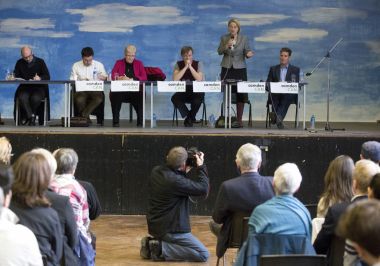Record number of election hustings held in churches

Churches are stepping up and holding a record number of hustings in the lead up to the 2015 General Election.
At least 325 hustings are set to take place in churches before May 7, according to Christian charity CARE, revealing a marked increase from the 293 registered in 2010. It follows weeks of campaigning by Christian groups, who have been encouraging believers to get involved in the process and make their concerns heard.
CEO of CARE, Nola Leach, said the church is playing a vital role in the election campaign, and that now "the Christian vote matters more than ever."
"Despite all the apathy and indifference we are constantly hearing about, the church is providing a place for debate, engagement and political involvement," she added.
"It's fantastic to see the church facilitating debate and political interaction."
Local churches engaging in politics by holding such events "help bring the political debate right into the heart of local communities," Leach added. Hustings give voters the opportunity to ask candidates questions about the issues that they care about, and hear them explain their policies.
"It's hugely welcome that more churches than ever before are prepared to get involved and provide a means for voters to question and listen as candidates set out their stalls."
There has been a marked attempt by candidates to court the Christian vote. David Cameron spent last Friday night at the largest Christian gathering in the UK – the Festival of Life. In a ten-minute speech, he described those gathered as "the Big Society in action," and praised Christians for their efforts to help vulnerable people.
"As God's children we are all one big family," he told the 45,000 people gathered.
Also this weekend, Opposition leader Ed Miliband said he found "common cause" with faith communities over such issues as inequality, tax avoidance and the rising use of foodbanks.
"I'm not somebody of religious faith. But what I recognise is that so many of the objectives that I have for this country, how we get a country that's not just run for the rich and the most powerful, that's something that motivates lots of people of faith from all backgrounds and all walks of life," he said.
"How people come to these issues is different but the view people take about these issues is actually very similar. So I think there's a really common agenda that I would have with people from the faith communities on these issues."











